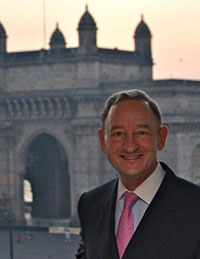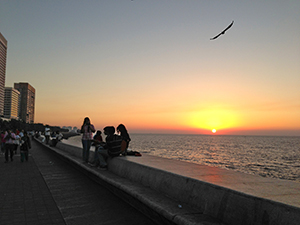 Chancellor Mark S. Wrighton is in India this week with a group of Washington University in St. Louis leaders and members of the McDonnell Academy Global Energy and Environmental Partnership (MAGEEP) to first talk about global energy and environmental solutions during an international symposium and then meet with the university’s International Advisory Council for Asia.
Chancellor Mark S. Wrighton is in India this week with a group of Washington University in St. Louis leaders and members of the McDonnell Academy Global Energy and Environmental Partnership (MAGEEP) to first talk about global energy and environmental solutions during an international symposium and then meet with the university’s International Advisory Council for Asia.
He is writing a daily dispatch, relaying everything from insights gleaned from the symposium to the sights and sounds from one of the most exhilarating countries in the world.
Today’s post: An early-morning visit to a Mumbai landmark, and the symposium continues with the announcement of a new McDonnell Academy partner and a charge for all to continue working together.
Dec. 12, 2012

Like our Gateway Arch in St. Louis, the Gateway of India — 85-feet-high and completed in 1924 — is an iconic monument. It is located across the street from the Taj Mahal Hotel in Mumbai, not far from the Oberoi Hotel where we have been staying. Both of these hotels were attacked by terrorists in 2008, but have been restored to beautiful, grand and safe places.
Security at the entrances to the hotels is not unlike that at airports, and automobiles are carefully inspected before entrance for drop off and pick up. Leaving at 6:45 a.m. for a short drive to the Gateway to India for a memorable photo provided us an opportunity to see a quiet, traffic-free Mumbai.
The McDonnell Academy symposium has featured presentations designed to expand our global network of partners focused on addressing the issues with the widespread use of coal as a major energy resource. New Academy partner, the University of Queensland in Brisbane, Australia, made a commitment to join Washington University, Tsinghua University in Beijing, China, and the Indian Institute of Technology, Bombay, as lead participants in a global network to address concerns with use of coal.
This new network is called Global CONCERN. Presenters from our Academy partners, academic and corporate leaders both, emphasized that no single energy resource will meet the world’s energy needs. The challenges associated with coal need to be addressed by cooperative research programs like those conducted by Academy partners.
The symposium participants included many students from around the world. Students presented posters and interacted with academic, government and corporate leaders. All contributed to strengthening both the education and research networks of our Academy partners.
It was a personal pleasure to see so many talented people from all parts of the world interacting socially and substantively exploring new approaches to solving the world’s energy and environmental problems.

The program of the day concluded with the President’s Forum, with partner presidents and representatives all on a large panel. It was moving to hear partner leaders extend public appreciation to our distinguished trustee and benefactor John F. McDonnell, who contributed to the vision that led to the founding of our McDonnell International Scholars Academy. John attended all sessions of the symposium, from 8 a.m. until 7 p.m.!
It was back to the Taj Mahal for a gala dinner for all symposium participants. We were all greeted by women in beautiful, traditional Indian attire, providing all guests with a garland of flowers — most festive and colorful!
We were treated to a short presentation by an IIT, Bombay, alumnus, who shared his experience in developing about 500 biofuels plants to produce ethanol from biomass in India and other countries. This presentation reminded us of the purpose of our meeting: to work together to provide sustainable energy for all.
This objective will require collaboration, innovation and entrepreneurial activity by talented people all around the world. The final presentation provided an invigorating conclusion to another long, but rewarding day in India.